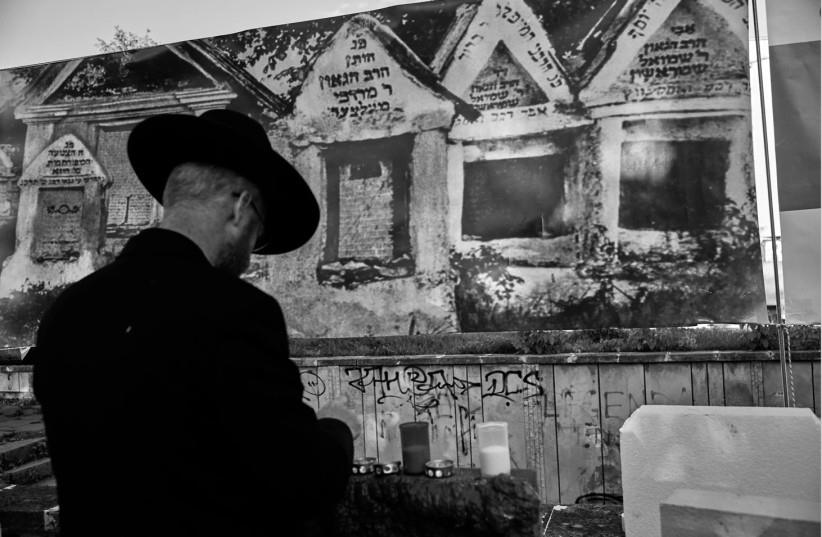NEW YORK – Zac Levin, a product manager in New York, will never forget the vastness of the 16th century Jewish Piramónt cemetery he visited in Lithuania six years ago.
Levin, whose family can be traced back to the Lithuanian cities of Mažeikiai and Kaunas, knew that 90% of the country’s estimated 250,000 Jews had been wiped out by the mid-1940s, but the cemetery, located in Vilnius’s central Šnipiškės district, helped put names – and scale – to those astronomical figures. Thousands of Jewish luminaries, including the Vilna Gaon up until 1950, were laid to rest there.
“Its scale enables you to realize what was lost when the community was all but snuffed out in the Holocaust,” said Levin.
Like many other historic Jewish cemeteries across Europe, the cemetery is open for all to visit, but it has attracted tourism – and international attention – for the wrong reasons. In the 1970s, Soviets leveled parts of the cemetery to build a brutalist-style Palace of Concerts and Sports.
The venue was shuttered in 2004 after being deemed unsafe, but the Lithuanian government has since sought to convert the dilapidated, graffiti-laden site into a convention center rather than tear it down and focus on restoring the cemetery. The move provoked intense international opposition, including from US senators, the chief rabbi of Israel and the European Foundation of Human Rights, and, today, the cemetery continues to be at the heart of a tense debate over the legacy of Jewish cultural heritage, and of the Holocaust.
In mid-August 2021, the Lithuanian government announced that it was freezing plans to build the convention center, in large part because COVID-19 “changed the conference tourism market and environment.” For now, no funding has been baked into the state budget for the convention center project in 2022.

But proponents of new construction aren’t giving up. In late August 2021, the city council of Vilnius passed a resolution urging Lithuanian authorities to go ahead with the development of the center. Vilnius Mayor Remigijus Šimašius was unavailable to immediately provide a comment for this story.
Grant de Graf, special officer for combating antisemitism at Save Vilna, an action group that fights against Jewish cemetery desecration and human rights violations in Vilnius, noted that a litany of memoranda and international agreements signed between the US and Lithuania preclude the government from building further on sacred ground. That includes the 2002 Agreement on the Protection and Preservation of Certain Cultural Properties, where the US and Lithuania agreed to protect cemeteries, he said, as well as an amendment to the International Religious Freedom Act of 1998, which passed in the US Congress in 2014, and included the desecration of cemeteries among the many forms of violations of the right to religious freedom.
“Save Vilna is currently in the process of putting together the Save Vilna Restoration Proposal, which we will be submitting to the government for consideration,” Graf said, adding that the plan would include a restoration of desecrated graves, a renovation to the external facade of the now-defunct Sports Palace and a special area designated for prayer in the complex.”
Advocates of a new conference center on the contested site argue that it would rejuvenate the city with much-needed modern infrastructure. “The idea of the congress center in Šnipiškės has been proposed due to the need to revive the abandoned building of the former Palace of Sports at the central location of the city and transforming it into a modern congress center that Vilnius is still lacking,” said Marius Janukonis, director of communications and the cultural diplomacy department at Lithuania’s Foreign Affairs Ministry.
Janukonis added that any decision made by the Lithuanian government is done in close coordination between the government, the Vilnius municipality and the Lithuanian Jewish community.
“The Vilnius City Council is one of the stakeholders of the congress center project and has a legitimate interest in developing conference tourism in Vilnius,” he said, “but the government is the key decision maker in this project, and we believe that the decision will be taken with regard to the interests of all parties, including the state, city, local and international Jewish communities and the business community.”
In a statement to The Jerusalem Post, US Ambassador to Lithuania Robert S. Gilchrist adopted a similarly conciliatory tone, noting that “the US Embassy has consistently encouraged the Lithuanian government to maintain an open and inclusive dialogue about the Šnipiškės cemetery site and all future plans for the area.” He added: “We are hopeful that the government, Jewish leaders and Lithuania’s Jewish communities will come to a consensus on an acceptable use of the site.”
Dovid Katz, a Vilnius-based historian and editor of anti-revisionist website Defendinghistory.com, was more skeptical of the government’s close cooperation with Lithuania’s Jewish community of around 3,000 people, noting that there “would be zero-zilch-gornisht-efes good to the local Jewish community from the humiliation of not succeeding to stand up for their ancestors’ graves.”
“After huge international protests, a number of people in the government saw that the convention center would be a national disaster in the long term,” said Katz, who has long been opposed to sullying the cemetery’s integrity. “To have canceled funding for this or that BS reason was the usual way of shutting up the irksome foreign Jews and satisfying the local far-right that just does not want a Jewish cemetery in central Vilnius.”
